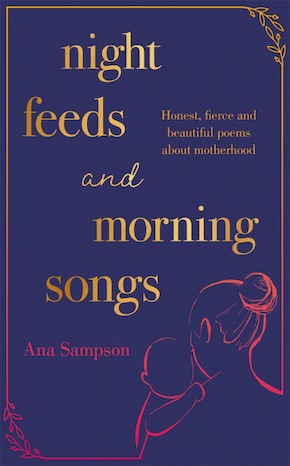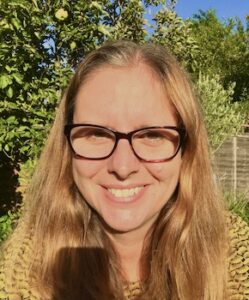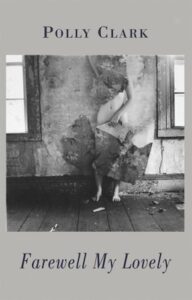The women who save you
by Ana Sampson
“A beautiful collection, capturing that soft everyday magic of having babies – it’s nice to have comradeship in this very particular type of love.” Imogen Hermes Gowar
The success of a journey depends on your fellow travellers. The poems in Night Feeds and Morning Songs remind me that we are not alone. Women walked and will walk this way, with their babies cocooned in their buggies or bound to their chests, hundreds of years ago, and yesterday, and tomorrow. They have wiped and kissed, patted and rocked, nagged and cheered, just as we do. Every pregnancy, every birth, every mother and every child is wildly different, but there are so many sensations and emotions I recognise in these pages.
Though most of us cope now without the mythical village that blissed-out blog posts are always harking back to, there are helping hands – particularly from women – that guide and support us along this path. Despite the fact that parenting advice can be a minefield, and much had changed since her own baby-rearing days, I was lucky that my mother was a calming presence. She insisted serenely on my angelic babyhood (in stark contrast, apparently, to my naughty little sister whose childhood nickname was the Demon Queen). A week in, and almost every day since, I have needed to thank my mother for acts of love I can’t even remember, as well as all those I can. Belatedly, I express proper gratitude for the honey and lemon drinks and the laundry, for homework supervision and refereeing the sibling battles, for boundless tact and a free taxi service. My no-longer-demonic sister came to my aid in those earliest days too. She eyed the new, raw, mad me with compassionate bafflement and sat with my daughter and me through the sweltering first day of my husband’s return to work. My much-loved and missed mother-in-law was so kind, always, and besotted beyond all reason.
The women whose first babies arrived with mine, women I’d only known in our strange newish pregnant state, became immediately, urgently intimate. Our relationships with each other were only a few weeks old, forged during feeding seminars and giggly attempts to swaddle rubbery dolls. We whispered reports from those who had gone before, wide-eyed and incredulous over the particulars: ‘Every three hours. Every. Three. Hours?’
We talked about how we wouldn’t use dummies (we did), how our homes would not be filled with music-emitting plastic horrors (they are), how we would grow vegetables or visit art galleries or write novels during our maternity leaves (we did not) and how our children would play with one thing at a time, and then put it away (this has never happened to anyone, anywhere).
There were days when getting to a baby group with milky vomit in only half my hair, having gulped a coffee that had only been microwaved twice, seemed an achievement akin to climbing a medium-sized mountain.”
When the babies came, a frenzy of electronic messages pierced the endless nights. We fed and rocked and hushed and changed and sent up our panic and our bewilderment like flares, waiting for the message that would say, yes, this happened to their cousin and it was a sleep regression, it was teething, it was colic and – crucially – it passed. It was a lifeline in those early weeks to have the means to confer at midnight – I felt extremely lucky to live in our connected age, and can’t imagine how lonely it must have been for generations before. We had dropped out of what I had previously considered our ‘real lives’, without a parachute and into strange new territory, together. There were days when getting to a baby group with milky vomit in only half my hair, wearing clothes that were indisputably daywear, having gulped a coffee that had only been microwaved twice, seemed an achievement akin to climbing a medium-sized mountain, and they got it. I recognise every one of the women in Polly Clark’s poem ‘Baby Group’. We congratulated each other on three-hour bursts of sleep, on spooning the tiniest dribble of pear into a reluctant mouth, on cutting the heart-stoppingly tiny nails.
Baby Group
by Polly Clark
Save me from my loneliness,
lady of the scar,
lady of the birth trauma
and the absent husband.
Distract me in the rain,
lady of the Asda fairy cake,
vacantly sipping as angels
circle in babywalkers.
And you, lady of perfection,
Boudica of cashmere
whose baby’s shoes are shiny,
whose ribbons reek of adoration,
though we may never say more
than hello, isn’t she lovely!
I am glad you exist.
You appear on a grey morning
right on time, smart as a sail
on bewildered waters.
from the collection Farewell My Lovely (Bloodaxe Books, 2009),
reproduced by permission of the publisher
There were other women, too, whose paths crossed mine only briefly, but who threw me a well-timed life raft. There was someone who wrote an article I read at three o’clock one morning about it being okay not to love everything about what Kathleen Jamie calls ‘the first sweet-wild weeks’. There was a woman on the bus who, without me asking, efficiently packed up my buggy as I struggled to calm a squalling, kicking baby. In fact, I am eternally grateful to all the women on public transport who said the right thing, and never: ‘Oh,’ – sucking teeth disapprovingly – ‘she’s hungry.’ I try to be among their number now.
I once attempted a Pilates class, during which the other babies reclined, cooing contentedly as their mothers did clever things to their cores. Only two, one of which was mine, refused to get with this peaceful programme, embarking on increasingly dramatic disruptive strategies. The other woman – a stranger – and I gave up and fled in mortification, mollified the babies with a trip to the swings and stole a cackling afternoon in a pub garden that did me more good than anything else that year. Including the Pilates.
Friends with older children have been a wellspring of comfort, emergency quiche deliveries, second-hand clothing and wisdom… They are cheerleaders and counsellors. I could not be without them.”
Nursery and school brought new pleasures – for them, messy play; for us, less messy play – but they have also ushered in an age of labyrinthine bureaucracy I couldn’t possibly have navigated without hacks passed on from other mothers. These new friends provide playdates and dinner dates, holiday club pointers, emergency travel cots and sanity-saving audiobooks for long journeys. They have done the big things – scooping up the kids when my train is delayed – and the small but necessary ones – offering heartfelt condolences that school have sent home a recorder for the holidays.
Friends with older children have been a wellspring of comfort, emergency quiche deliveries, second-hand clothing and wisdom. (I made formal apologies to them for every time I had bemoaned how tired I was in my child-free days, which they graciously accepted. They are classy women.) I have never stopped turning to them for reassurance, tips and, occasionally, the freedom to vent about a particularly grisly school run. They are cheerleaders and counsellors. I could not be without them.
For every woman I met on the streets of Liz Berry’s ‘The Republic of Motherhood’ who sympathised about an up-the-back poo, who shot me a look of amused solidarity while I negotiated with a toddler howling on the pavement because ‘a dog left’, who gave me socks for my baby’s hands when I had come out in the cold without mittens: thank you. For everyone who admitted – in person or online – that they lost their temper, that they hadn’t technically got dressed today, that their kids ate toasties every night this week, or that they didn’t actually enjoy crafting: thank you. To the mothers and mothers-in-law, the sisters and friends, and the strangers who are up for an impromptu pub garden afternoon: here’s to you. Here’s to us.
from Night Feeds and Morning Songs (Trapeze, £12.99)
 Ana Sampson studied English Literature at the University of Sheffield and gained a BA and MA before starting a career in publishing. She has worked in publicity in publishing for almost twenty years, and has been editing poetry anthologies since 2009, most recently She Is Fierce and She Will Soar (Macmillan, 2018/2020). She writes and speaks often about poetry in the media, and has spoken about poetry and publishing at literary festivals, bookshop events, libraries and schools. She lives in Surrey with her husband, two young daughters and two middle-aged cats. Night Feeds and Morning Songs is published by Trapeze in hardback, eBook and audio download.
Ana Sampson studied English Literature at the University of Sheffield and gained a BA and MA before starting a career in publishing. She has worked in publicity in publishing for almost twenty years, and has been editing poetry anthologies since 2009, most recently She Is Fierce and She Will Soar (Macmillan, 2018/2020). She writes and speaks often about poetry in the media, and has spoken about poetry and publishing at literary festivals, bookshop events, libraries and schools. She lives in Surrey with her husband, two young daughters and two middle-aged cats. Night Feeds and Morning Songs is published by Trapeze in hardback, eBook and audio download.
Read more
anasampson.co.uk
@AnaBooks
@TrapezeBooks


